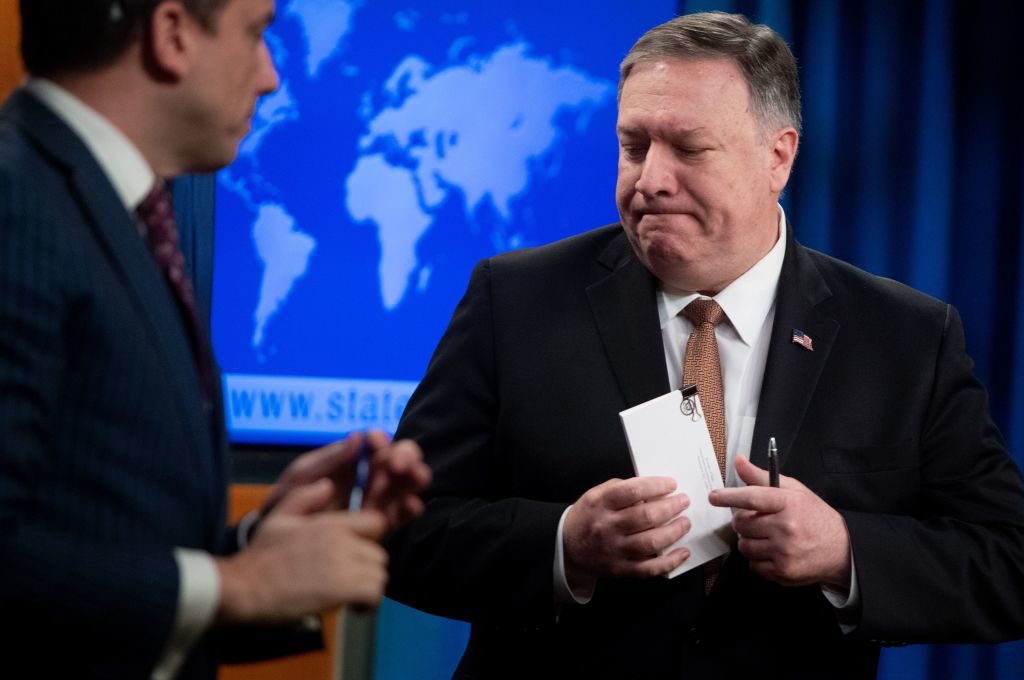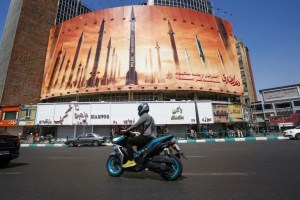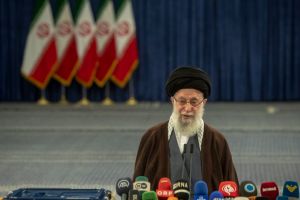If Donald Trump secures an encore in 2020 and if the clerical regime in Tehran doesn’t fall of its own volition – action could be taken to tackle Iran.
That’s the state of play, I can say, based on countless discussions with dozens of current and former administration officials over the last two years of this presidency.
A former senior administration told me last year that war with Iran remained ‘very’ possible. Today the State Department formally designated the Iranian Revolutionary Guards Corp (IRGC), including its vaunted Quds Force, a terrorist organization. As Mike Pompeo’s own team pointed out, this is an extraordinary step: ‘It is the first time that the United States has designated a part of another government as an FTO,’ a State spokesman said. ‘Designating a part of Iran’s government as a terrorist organization is a step toward saying, ‘we cannot live with them and have to bomb them,”’ Benjamin H. Friedman of Defense Priorities said.
This may seem abstract talk. It isn’t.
North Korea – as predicted by a departing Barack Obama – has dominated headlines in this administration. Kim Jong-un makes for good copy: he is Rocket Man, and Rocket Man, though a throwback, is pitch-perfect 21st century television. But the administration was never seriously going to war with North Korea – unless, of course, ‘adult in the room’ H.R. McMaster had gotten his way. The focus, just beneath the surface, has always been: Iran, Iran, Iran. As Steve Bannon told Robert Kuttner in his final days in the White House: ‘There’s no military solution [to North Korea], forget it. … Until somebody solves the part of the equation that shows me that 10 million people in Seoul don’t die in the first 30 minutes from conventional weapons, I don’t know what you’re talking about, there’s no military solution here, they got us.’
Iran, not North Korea, is this administration’s foreign policy’s target.
Though the administration and its outsized, outside apparatus dithers on officially declaring regime change the order of the day, it’s clear the die is cast. ‘The United States hopes the next 40 years look radically different,’ State’s Iran point-man Brian Hook said in front the abandoned Iranian embassy in Washington in February. Said Hook: the people of Iran should take their ‘rightful place,’ and abandon ‘a corrupt, religious mafia.’
The assignment of the IRGC could mean justification for a strike under the Authorization for Use of Military Force (AUMF), originally enacted in the dark ecstasy of the September 11 aftermath. Now Iran’s soldiers are, legally, terrorists and therefore legitimate targets.
Doubtless, many experts will argue this maneuver is a crock. ‘It seems to me the argument on its face is implausible,’ Gene Healy of the Cato Institute told me. ‘There has to be some link, however strained — or broken, as in the ISIS case — to the perpetrators of 9/11.’
Further: playing up the Iranian regime’s ties to al-Qaeda has become imperative for some, in recent years. Because of such chatter and contingencies, realists in Washington – and on the Hill – including former Democratic vice presidential candidate Tim Kaine have long made the case for a fresh, more bespoke authorization. But no dice.
Important: the regime change chorus insists it does not seek war.
Iran hawks, by and large, think it’s 1989, not 2003: Tehran’s house of cards, if pressured, will pancake as eastern bloc Marxism-Leninism did during George Bush and Gorbachev, goes the line of thinking. Iraq redux is not needed, in other words. This is the line of the controversial – and deeply influential – People’s Mujahedin of Iran (the MEK), and its Washington proxy, the National Council for the Resistance of Iran (NCRI), who count among their friends the national security adviser John R. Bolton, and rising Republican stars, such as Sen. Josh Hawley. The MEK’s leader, Maryam Rajavi said Tuesday that the IRGC designation is another step in the global imperative to ‘recognize the right of the Iranian people and the resistance to overthrow the ruling religious fascism.’
But the waters get murkier.
What if a pressure approach fails? Mark Dubowitz, chairman of the formidable Foundation for the Defense of Democracies (FDD), the administration’s ex-officio shop on Iran, believes sanctions heat could be ratcheted up from about a six – the status quo – to an eleven. But recent reporting indicates that the sanctions are having a medium-term impact in the opposite direction than was intended – smoothing over internal political divisions, buttressing the country’s hardliners and imbuing the Iranian population with a sense of anti-American nationalism. It’s hard to know, even for our nation’s peerless intelligence services, just what the mood is in a country so isolated from the US global order. We’ve gotten this wrong before.
Taking down Iran is the goal. Military options would be on the table, if Republicans hold power, and the current approach doesn’t annihilate the regime from afar. Opponents of such maneuvers – namely, James Mattis – have been swept aside. Perhaps the biggest remaining impediment – other than extremely soft public support for this course – could be the president himself, wary of repeating George W Bush’s mistakes.
But the cold case for a strike remains, and Donald Trump has so far not intervened against his apparatchiks’ regime change march. The administration sees a return of great power competition everywhere – correspondingly a Mackinder-minded imperative to cut up Eurasia predominates. Iran is the weakest link; taking it out would scramble the region for a decade, and produce bifurcation in the global energy markets. The US, as Pompeo has impressed, is back in the Middle East – and it is taking sides. As neoconservative columnist Eli Lake wrote last week: a ‘growing number of Democratic presidential candidates pledging to rejoin the 2015 Iran nuclear deal… shows a party ready to embrace neutrality in the conflict for the future of the Middle East — a conflict that pits Iran against America’s historic allies in the region.’ Neutrality may seem prima facie prudent for realists, but it is not they, at current, in the commanding heights. And for now, a President Buttigieg sits idle, and may be stillborn.
Hitting Iran: the opening salvo, short of a spectacular pretext such as a terrorist attack, would likely look more 1998 – when the US under Clinton hit Iraq in a targeted fashion – than 2003 and the outright decapitation of the government. NSA Bolton has floated this, in his proposal for a post-Iran deal world in 2017 – which came to pass.
As Bolton wrote in National Review: ‘With Israel and selected others, we will discuss military options.’


















